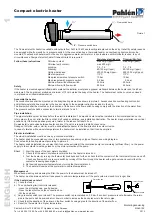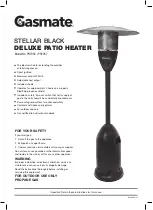
A minimum supply pressure of .5 psi is required for the purpose of input
adjustment of propane gas. Storage of an appliance indoors is permissible
only if the cylinder is disconnected and removed from the appliance. A cylinder
must be stored outdoors in a well-ventilated area out of the reach of children.
A disconnected cylinder must have dust caps tightly installed and must not
be stored in a building, garage, or any other enclosed area. The minimum
permissible gas supply pressure of 11 W.C. is required for purpose of hose
adjustment. The minimum hourly of 17,500 BTU is required input rating for
a heater for automatic operation rating less than full input rating.
The pressure regulator and hose assembly supplied with the appliance must
be used.
The installation must conform with local codes, or in the absence of local codes,
with national fuel gas code, ANSI Z223.1/NFPA54, natural gas and propane
Installation Code, CSA B149.1, or propane storage and handling code, B149.2
A dented rusted or damaged propane cylinder may be hazardous and should
be checked by your local cylinder supplier. Never use a propane cylinder
with a damaged valve connection. The propane cylinder must be constructed
Department of Transportation (DOT) or the standard for cylinders, spheres and
tubes for transportation of dangerous goods and commission, CAN/CSA-B339.
• The cylinder must have a connection device compatible with the connection
for the appliance.
• The cylinder used must include a collar to protect the cylinder valve.
• Never connect an unregulated propane cylinder to the heater.
• Do not store a spare LP-gas
cylinder under or near this
appliance.
80 percent full.
• Place the dust cap on the
cylinder valve outlet whenever
the cylinder is not in use. Only
install the type of dust cap
on the cylinder valve that is
provided with the cylinder
valve. Other types of caps or
plugs may result in leakage of
propane.
OPERATION
9
HAMPTONBAY.COM
Please contact 1-855-HD-HAMPTON for further assistance.

































